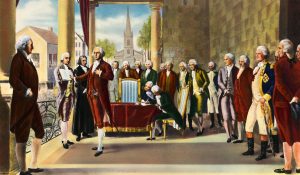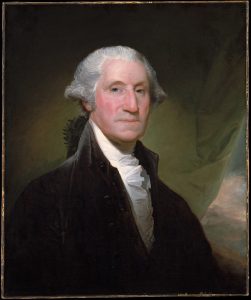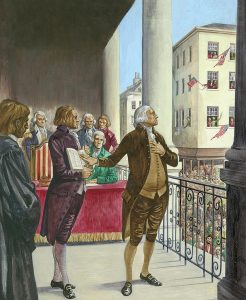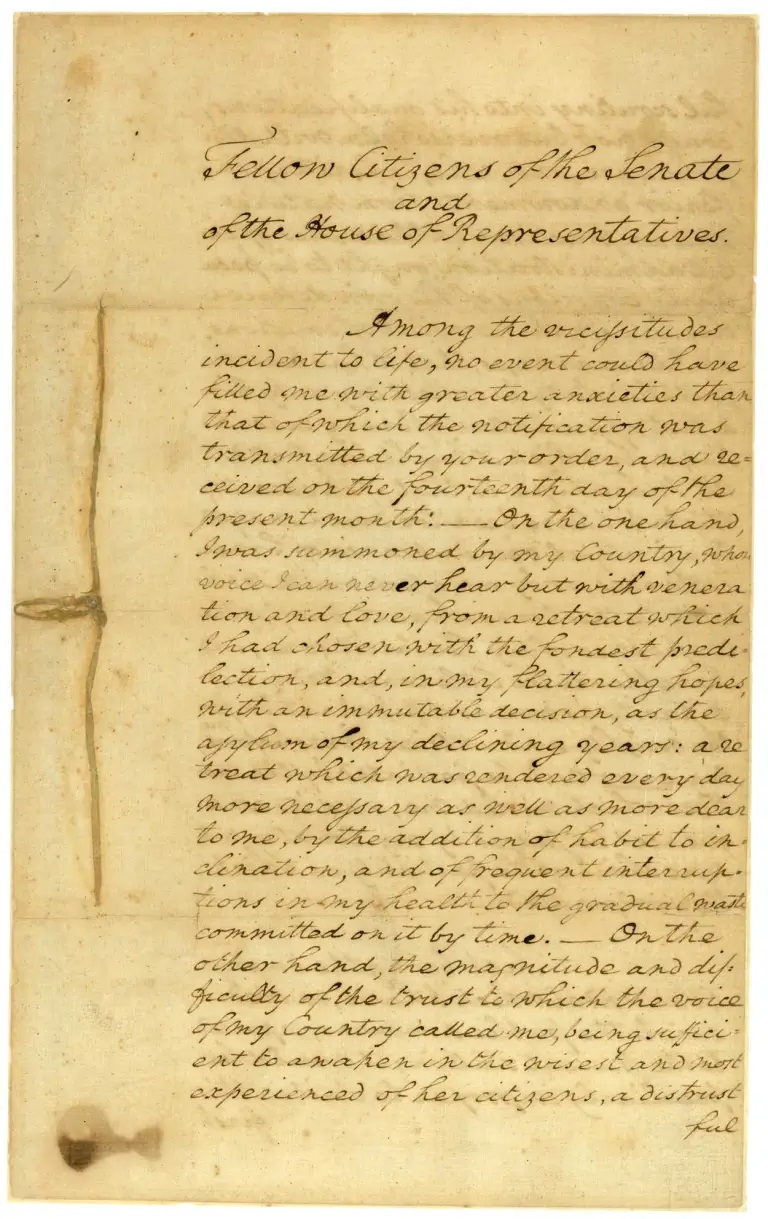George Washington was the first President of the United States. He was inaugurated on April 30th, 1789, and gave an inaugural address to ten thousand people.[1] This address was very important and a plea to Congress. Washington wanted a more robust constitution. During this time, the Constitution did not represent everyone. Many important groups of people were left out, including Native Americans and women. “In his inaugural address, written by Alexander Hamilton, Washington appealed for unity, pleading with Congress to abandon ‘local prejudices’ and ‘party animosities’ to create the ‘national’ outlook necessary for the fledgling republic to thrive” (Shi).[2]

Washington being inaugurate in New York City
George Washington was not looking to become president. Before becoming elected, he was looking to settle down and retire. “Washington’s determination to retire was evident. He resigned as vestryman of Truro Parish and made no effort to participate in Virginia politics, resolving to occupy his time with pursuits he had dreamed of during the war” (Ketchum).[3] Washinton made it evident in his speech that he did not feel confident taking this position. He expressed anxiety about the inauguration day. “Washington begins by humbly revealing his insecurities, reluctance, and lack of confidence a accepting such an official position” (Qaiser).[4] Washington expressing his true feelings showed his humanity and honesty with the public. In his address, he describes himself as “inheriting inferior endowments from nature, and unpracticed in the duties of civil administration” (Washington). [5] Although he feels this way about himself, it is evident through his address that Washington accepts the presidential position out of love for the country.

Portrait of George Washington
In his address, he states, “When I was first honored with a call into the service of my country, then on the eve of an arduous struggle for its liberties, the light in which I contemplated my duty required, that I should renounce every pecuniary compensation” (Washington).[6] This quote is Washington refusing compensation for his presidency. “He feels this is a selfless act of public service and should not be sullied with monetary gains” (Qaiser)[7]. His refusal of money showed the public how true his intentions were. Washington reluctantly took this position and only did so out of his love for the United States.

George Washington being sworn in as President of the United States.
Washington’s inaugural address demonstrates his devotion to the country. Although reluctant to take the position he is dedicated to America. His goal as president is to form a strong and united country. He ends his speech by stating “I shall take my present leave; but not without resorting once more to the benign parent of the human race, in humble supplication that since he has been pleased to favor the American people, with opportunities for deliberating in perfect tranquility, and dispositions for deciding with unparalleled unanimity on a form of Government, for the security of their Union, and the advancement of their happiness” (Washington).[8] Washington acknowledges that the happiness of the citizens is a main priority in the government he is forming.
[1] Annie Qaiser. 2013. How to Analyze the Works of George Washington. Essential Critiques. Minneapolis, MN: Essential Library, 23. https://search.ebscohost.com/login.aspx?direct=true&AuthType=sso&db=e700xna&AN=544377&site=eds-live.
[2] David Emory Shi, America: A Narrative History (W. W. Norton & Company; 12th edition, 2022), 236.
[3] Ketchum, Richard. 2015. George Washington. Newbury: New Word City, Inc. https://search.ebscohost.com/login.aspx?direct=true&AuthType=shib&db=e900xww&AN=1361449&site=ehost-live.
[4] Annie Qaiser. 2013. How to Analyze the Works of George Washington. Essential Critiques. Minneapolis, MN: Essential Library, 24. https://search.ebscohost.com/login.aspx?direct=true&AuthType=sso&db=e700xna&AN=544377&site=eds-live.
[5] George Washington’s first inaugural address, 30 April. 30 April, 1789. Manuscript/Mixed Material. https://www.loc.gov/item/mcc.053/.
[6] Ibid.
[7] Annie Qaiser. 2013. How to Analyze the Works of George Washington. Essential Critiques. Minneapolis, MN: Essential Library, 26. https://search.ebscohost.com/login.aspx?direct=true&AuthType=sso&db=e700xna&AN=544377&site=eds-live.
[8] George Washington’s first inaugural address, 30 April. 30 April, 1789. Manuscript/Mixed Material. https://www.loc.gov/item/mcc.053/.
Bibliography
Annie Qaiser. 2013. How to Analyze the Works of George Washington. Essential Critiques. Minneapolis, MN: Essential Library. https://search.ebscohost.com/login.aspx?direct=true&AuthType=sso&db=e700xna&AN=544377&site=eds-live.
Browne, Stephen Howard. 2016. “‘Sacred Fire of Liberty’: The Constitutional Origins of Washington’s First Inaugural Address.” Rhetoric and Public Affairs 19.
doi:10.14321/rhetpublaffa.19.3.0397.
David Emory Shi, America: A Narrative History (W. W. Norton & Company; 12th edition, 2022).
George Washington’s first inaugural address, 30 April. 30 April, 1789. Manuscript/Mixed Material. https://www.loc.gov/item/mcc.053/.
Ketchum, Richard. 2015. George Washington. Newbury: New Word City, Inc. https://search.ebscohost.com/login.aspx?direct=true&AuthType=shib&db=e900xww&AN=1361449&site=ehost-live.
